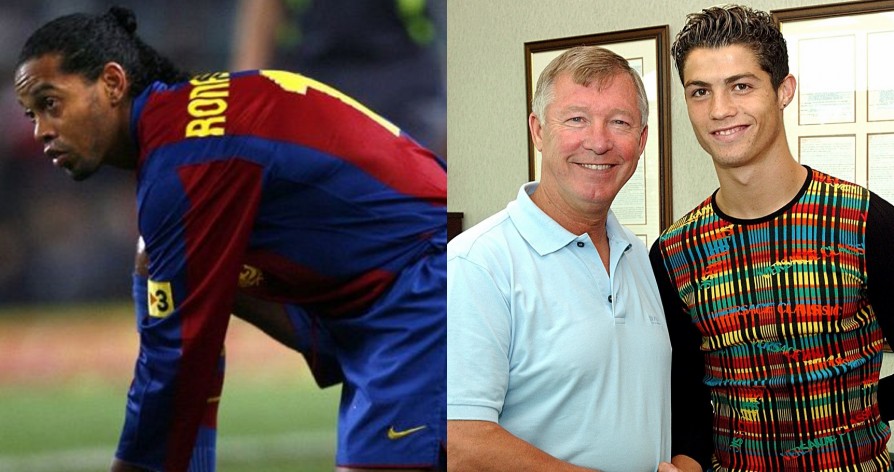The phrase “blessing in disguise” is one that was first found in mid-1700’s English, and is used to mean something that first appeared bad or unlucky, but actually turned out to be good. Recently, it is a phrase which has seeped into the footballing lexicon. It is often said that when a team goes out of a cup competition that it may be a “blessing in disguise”, as it will allow the team to concentrate on their primary competition and play less games.
Other instances in which the term is used is when a club misses out on a player who then goes on to do poorly at their current club or a different team they signed for. Alternatively, the failure to sign one player may have resulted in the signing of another, who turned out to be a much shrewder piece of business. Sometimes an injury to one player which paves the way for another player to come into the fold and experience great success is described as a blessing in disguise as well.
All of these examples and more feature in this list of some moments in footballing history when a team or individual felt they had been hard done by or had a bad experience, only for that very thing to be the cause of great success. Here are the top 15 blessings in disguise in soccer history:
15. Liverpool Fail To Sign Clint Dempsey

The U.S.M.N.T. talisman Clint Dempsey appeared an ideal transfer target for new Liverpool boss Brendan Rodgers in 2012. Dempsey had scored a mightily impressive 17 goals in 37 games for Fulham the previous season, and having already shipped Andy Carroll out on-loan, Rodgers saw Dempsey as the perfect fold for Luis Suarez. The Liverpool owners even announced the signing of Dempsey, but the deal was not done, with Fulham demanding more than Liverpool were willing to pay.
Liverpool offered Jordan Henderson as part of the deal but Henderson rejected the move and Dempsey signed for Tottenham. The American only managed seven goals in 29 games for Spurs, and left after a single season, while Henderson has gone on to become one of Liverpool’s most important players.
14. Mario Balotelli Sent Off at Arsenal

Roberto Mancini didn’t have one but two fiery forwards to try and manage during the 2011-12 season. After Carlos Tevez refused to warm up against Bayern Munich though, Mancini said he’d never play for the club again and it was Balotelli who got the nod. The Italian scored 13 in 23 games, but as Man City fell apart towards the end of the season, Balotelli saw red for a petulant challenge away at Arsenal.
His absence saw the return of Carlos Tevez, whose formidable partnership with Sergio Aguero inspired the Sky Blues to win their first title in 44 years.
13. Soren Cratz Contract Not Renewed

Swedish top flight outfit Hammarby announced midseason in 2001 that they wouldn’t be renewing the contract of manager Soren Cratz, due to the “boring” football he had the team playing. Cratz was enraged, and described their comments as “bulls**t”. Knowing he would be leaving at the end of the season, Cratz felt the best away to humiliate the owners was to play an exceptionally vibrant, attractive and attacking style of play.
The style saw Hammarby become a real force and they went on to win the league in 2001, as Cratz departed having made his point but also having won the owners the club’s first top flight league title in their history.
12. Aston Villa Cup Failure – 1981

The 1980-81 First Division title was largely seen as a two horse race between Ipswich Town and Aston Villa. It was arguably Ipswich who played the better football and appeared the stronger of the two. Villa weren’t in a European competition that season and crashed out of both the League Cup and FA Cup in the third round.
Ipswich meanwhile reached the semi-final of the League Cup, won the UEFA Cup and went further in the FA Cup, knocking out Villa. All this meant was Ipswich had to play a staggering 18 games more than Villa and it was Villa who won the First Division title by three points.
11. Greece Thrashed By Finland

Having taken over the Greece job in 2001, German coach Otto Rehhagel realized just how much of a task he had on his hands when his team were thrashed 5-1 by a hardly world class Finland team. Renowned for his attacking style of play, Rehhagel needed a quick change of plan, as it was clear he did not have the players at his disposal to implement such a style.
He quickly switched to a defensive-based game, with an emphasis on keeping clean sheets. Greece went on to qualify ahead of Spain for Euro 2004 and went on to win the tournament, without conceding a single goal in the knockout stages.
10. Rene Bliard Injured in World Cup Warm-Up

In the build up to the 1958 World Cup, many French supporters were disappointed that Just Fontaine couldn’t get into the national team. Despite having scored freely for his club, something hadn’t clicked at international level and it was his teammate Rene Bliard who was first choice ahead of the tournament.
Bliard picked up an injury in a warm-up game in Sweden though, and Fontaine got the nod. He went on to score 13 goals in six games at the tournament, the most goals any player has ever scored at a single World Cup.
9. Southampton Double Relegation

When Southampton were relegated from the Premier League in 2004-05, and from the Championship down to League One in 2009-10, you would have a hard time convincing many Saints fans that this was a good thing. Yet in many ways it was. The drop in standards gave the club the chance to hoard far more youngsters than they would have been able to in the top flight, and the likes of Gareth Bale, Theo Walcott, Adam Lallana and more all paved the way for a golden generation still being enjoyed by the club.
8. Jimmy Greaves Injured in 1966

One of the most clinical forwards in English football history, Jimmy Greaves was a shoe-in for the 1966 World Cup as the county’s top striker. The 44 goals in 57 caps he scored for England showed that Jimmy could do it at international level. Greaves picked up an injury though and it was Geoff Hurst who stepped into his shoes.
Aged 25, Hurst had only made his England debut a few months earlier, but went on to become the only player in history, to date, to have scored a hat-trick in a World Cup final as England won the tournament on home soil.
7. Manchester United Fail To Sign Ronaldinho

Sir Alex Ferguson had been rumoured to have been tracking PSG’s gifted attacking midfielder Ronaldinho for some time before registering a formal bid in 2003. The Red Devils were reportedly close to sealing the deal when Barcelona came in and gazumped them, signing the Brazilian for 30 million euros.
Having missed out on Ronaldinho, Sir Alex turned his attention to an emerging Portuguese talent who went by the name of Cristiano Ronaldo. He signed Ronaldo for half the price of Ronaldinho, before selling him to Real Madrid six years later for a world record transfer fee
6. Calciopoli Scandal

The Calciopoli Scandal was hugely damaging to Italian football and in many ways was far from a blessing in disguise. But for one group of people it was just that, and they were the Italian national team. Italy went into the 2006 World Cup in Germany regarded as a country in a turmoil and a national team who many considered would be plagued by internal issues and fallouts, making them rank outsiders. Most people wrote them off without noting the sheer quality of that squad. Italy saw off hosts Germany in the semi-final before beating France in the final to win the 2006 World Cup.
5. Leeds Lose Twice in a Week

You would do well to convince any Leeds United supporter that losing twice in one week to their former bitter rivals Manchester United was a good thing, but in the 1991-92 season, that was arguably the case. By bizarre coincidence the two teams who were fighting for the title were paired against one and another in both cup competitions, played over one week. Manchester United won both games, winning 1-0 in the FA Cup and 3-1 in the League Cup. They went on to win the League Cup, but it was Leeds who won the First Division, most likely in no small part to the seven games fewer they had to play.
4. Dion Dublin Breaks His Leg

It seems almost distasteful to call someone breaking their leg a ‘blessing in disguise’, such is the severity of the injury, but for Manchester United, Dion Dublin’s serious injury was arguably a defining point in the history of the club. His leg break forced Alex Ferguson into signing Eric Cantona, and while Dublin was a very good player, it seems unlikely that he would have had the profound effect at Old Trafford that Eric Cantona did. Cantona went on to win four Premier League titles with Manchester United, while Dublin left the club for Coventry City after just 12 games.
3. Barca Miss Out on Beckham

The third placed entry on this list and it is one that is very closely tied to seventh. In the summer of 2003, David Beckham was very closely linked with a move to Barcelona, with the club president even describing the deal as being as good as done. But it was Real Madrid who swooped in and made Beckham theirs, prompting Barcelona to look elsewhere.
Elsewhere turned out to be Ronaldinho, and the Brazilian went on to become a genius at Barcelona, winning two league titles and one Champions League, arguably being a far greater fit at the Camp Nou than Beckham would have been.
2. Emerson Dislocates His Shoulder

The Brazil team of 2002 was one laced with attacking quality. The R’s made up of Ronaldinho, Rivaldo and Ronaldo were enough to strike fear into any defense, but there were always question marks regarding their defensive capabilities. One thing Brazil needed was an excellent holding midfielder.
It was Roma midfielder Emerson who was the first choice before he offered to go in goal during a training session ahead of the 2002 World Cup. Emerson dislocated his shoulder and Gilberto Silva came into the team. Silva had an exceptional tournament, providing an ideal shield for Brazil’s attacking might, and they went on to win the World Cup relatively comfortably.
1. Germany Lose 5-1 To England

England and Germany provide one of international football’s best rivalries, with the overall scores currently tied with 12 wins for each nation. When Germany beat England 1-0 in the final match at the old Wembley Stadium there was some hurt among the England fans, and the opposite fixture held in Munich became a big fixture not just due to the importance of qualifying for the 2002 World Cup. Germany took the lead after just six minutes, but in a remarkable turnaround, England went on to thrash Germany 5-1, with a Michael Owen hat-trick doing much of the damage.
The result was seen as humiliation for the Germans. A defeat that brought about a new era for the German game. They revamped how football was run in the country, from grassroots, to academies, to the professional game. This revamp has seen a huge turnaround in the level of player produced by Germany in recent years, ultimately culminating in their success at the 2014 World Cup in Brazil.



